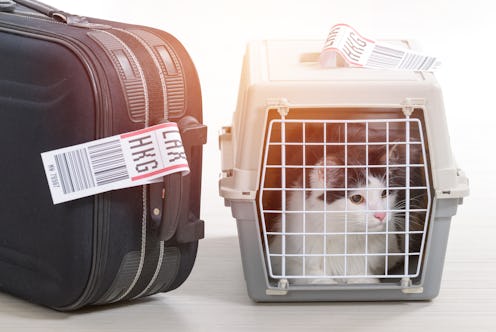Life
This New Proposal Could Block Your Cat From Flying With You

Pretty soon, it's possible you won't see as many pets in U.S. airports. According to a statement shared by the U.S. Department of Transportation on Jan. 23, new proposed regulations would severely limit which service animals are allowed on planes. If passed, the new rule would allow airlines to ban cats, rabbits, peacocks, and other animals accompanying passengers for emotional support. Specially trained dogs would count as one of the only exceptions.
The proposal comes in response to concerns raised by airlines, flight attendants, and people with disabilities, the U.S. Department of Transportation’s statement says. The new regulations recognize the “integral role that service animals play in the lives of many individuals with disabilities,” the department clarifies. It also appears to be in response to the apparent increase in passengers posing exotic pets like peacocks, reptiles, and sugar gliders as emotional support animals. The department states that the suggested rules are meant to limit the people who “falsely claim their pets are service animals.”
In other words, it sounds like they're working to crack down on people passing their pet along as an emotional support animal as a means to avoid travel fees — something that ultimately hurts people with physical or psychological disabilities, and require service animals for their well-being.
The newly proposed regulations would counter previous rules that prioritized animals like cats and miniature horses as service animals, in addition to dogs. If the proposal goes through, any passengers with disabilities who want to bring a dog onto a flight as a service animal will need to fill out a federal form, the New York Times reported. That form will attest to the dog’s training and ability to perform tasks in correspondence with the person’s specific needs. While the new plan would limit service animals to dogs, it would prevent breed-specific dog bans like Delta’s current ban on pit bulls.
Multiple airlines have seen a rise in emotional support animals, as reported by AP News. Companies like Southwest Airlines and American Airlines handle over 190,000 and 155,000 emotional support animals per year, respectively. AP News also reports that American Airlines saw a 48% increase in emotional support animals accompanying passengers between 2016 and 2017. In that time, the number of checked pets has dropped 17%.
The newly proposed regulations pose some concern about the distinction between a service animal and an emotional support animal. The plan specifies that the department will “no longer consider an emotional support animal to be a service animal.” The use of emotional support animals if often mocked or abused like in instances of someone registering beer as an “emotional support animal” — something a person in Brooklyn recently did, as reported by the New York Post. Again, emotional support animals do help people when trained, and the misappropriation of the label hurts those who require such services.
The response to the plan appears to be mostly positive, though it does raise some questions about additional barriers for people with disabilities who require a service animal. As mentioned in the blog statement, the U.S. Department of Transportation is seeking public comment on the new service animal amendment for 60 days. After that time, the department will make a final decision on the proposed new regulations.